[Click on BLUE links for sources and information]
The honest man must be a perpetual renegade, the life of an honest man a perpetual infidelity. For the man who wishes to remain faithful to truth must make himself perpetually unfaithful to all the continual, successive, indefatigable renascent errors. Charles Peguy
Give me your honest opinion. I don’t want truth with a veil on—I like naked ladies naked. Christina Stead
A truth that’s told with bad intent. Beats all the lies you can invent. William Blake: “Auguries of Innocence”
There are lies of commission and lies of omission. There are gross lies and subtle lies. There are little white lies and big bold lies. There are “lies, damned lies, and statistics.” We all lie, even to ourselves, whether we admit it or not.
I’m going to tell you something: thoughts are never honest. Emotions are. Do not go around asking for honesty in what people think; much of what they perceive as thinking is empty anyway because it’s thought out again and again and comes out refined and muddy. The ones who know how to feel might have to say to you a couple of interesting things or not and when they do that, you ought to know how to listen. So learn how to listen. You can’t make someone open up about their feelings in case they don’t want to. But you can remain open yourself through listening deeply and completely; they might want to talk about the weather and keep it simple — allow them to feel the simplicity…Emotion pours out directly or indirectly each time people engage themselves in the process of genuine interaction. Albert Camus
Have you ever lied to a spouse or a friend when they asked you if they were fat or if they looked good in a particular outfit or when they asked your opinion of a book they were writing or about their ability to sing or act? Have you ever lied to get out of an appointment or party you didn’t want to go to? Have you ever lied to someone you love about a medical diagnosis or to a child to protect them from some awful reality? What about someone whose spouse is having an affair or whom you suspect is an alcoholic or who is showing early signs of dementia? Are you always truthful to those in authority, a customs agent, a policeman, a teacher, a parent? Have you ever lied to protect someone from violence? Have you ever been caught in a lie?
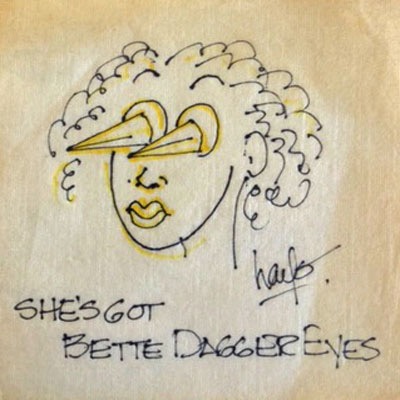
Sea Gull Cellar Bar Napkin Art, Jack Haye artist
While “little white lies” have always been around, recent data point to an erosion of respect for the truth in favor of other values such as loyalty to a group. Some fear “truth decay” is an increasing problem all around the world.
However you justify lying, there are persuasive arguments that almost all lies have negative consequences even those designed to “protect”. Consider, for example, Brad Blanton’s book Radical Honesty or Sam Harris’s essay Lying. Lying can be exhausting for the liar and damaging to everyone involved no matter the justification.
You have a choice,” she told the class. “The whorish emptiness of lies or the straightlaced horrors of truth. Lorrie Moore, Anagrams
Honesty can be painful but so can deception or holding feelings inside.
Counting Crows, Speedway, Hat Tip Ben Hourigan
We get so uptight from trying to stay polite and do the nonexistent “right thing” all the time that we hide the truth—the visceral, present-tense reality of our experience—from others and, worse, from ourselves. Ben Hourigan
The problem with “radical honesty” is that it can be so damn disrupting to the peace and calm that many people desire. (Don’t upset the apple cart.) The complexity of honesty, truth and loyalty are the theme of the movie Florence Foster Jenkins starring Meryl Streep and Hugh Grant. Florence (Meryl Streep) thinks she is a great singer but she isn’t. St. Clair, her “husband”, wants to protect her from the truth for many reasons, some selfless, others selfish. Radical honesty is not only disrupting, it can be dangerous in many real life situations even if it is the truth that will set you free.
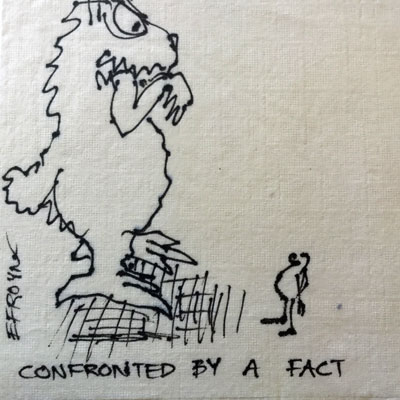
Sea Gull Cellar Bar Napkin Art, Max Efroym artist
And ye shall know the truth, and the truth shall make you free. John 8:32, King James Bible
Having seen more of the world and encountered places where terrifyingly extreme authoritarianism holds sway, I see that honesty can at times be suicidally dangerous. Ben Hourigan
Albert Camus’s famous novel, The Stranger, is about these “suicidal” dangers of radical honesty. “I only meant that the hero of my book is condemned because he does not play the game,” says Camus. He goes on to explain:
A much more accurate idea of the character, or, at least, one much closer to the author’s intentions, will emerge if one asks just how Meursault doesn’t play the game. The reply is a simple one: he refuses to lie. To lie is not only to say what isn’t true. It is also and above all, to say more than is true, and, as far as the human heart is concerned, to express more than one feels. This is what we all do, every day, to simplify life. He says what he is, he refuses to hide his feelings, and immediately society feels threatened. Albert Camus, Lyrical and Critical Essays, Preface to the Stranger

Sea Gull Cellar Bar Napkin Art, James Maxwell artist
The philosopher Walter Kaufmann lists honesty as the fourth of his four cardinal virtues:
A little honesty is so easy, so common, so unavoidable, it is hardly a virtue. But thorough honesty is the rarest and most difficult of all the virtues; and without that, each of the other three is somewhat deficient. Lack of thorough honesty takes so many forms . . . dishonesty says: my views are what I mean; yours are what you said. Dishonesty says: you are doing all you can. Dishonesty approximates the mythical ubiquity of original sin. It finds expression in unnecessary complications that, even if not designed to look impressive to the gullible, help to deceive the writer, or the speaker, about his own lack of clarity and other weaknesses … Modesty is so much easier than honesty because it is compatible with sloth. Walter Kaufmann
One would think that a deterrent to lying would be the negative consequences and in some cases that may be true. However, there are two reasons why it may not be true. Neither people nor sophisticated lie detectors are much better than flipping a coin when it comes to distinguishing a lie from the truth. While the technology of lie detectors is improving, U.S. courts do not, as yet, accept them as evidence. Bottom line, it’s hard to distinguish liars.
So everything lets us down, including curiosity and honesty and what we love best. Yes, said the voice, but cheer up, it’s fun in the end. Roberto Bolano: 2666
A second reason is that uncovering the lies of politicians, especially today, seems to have little impact on the public’s judgment of their elected officials. Tribalism, populism, class warfare and loyalty to the group trump honesty for many people today.
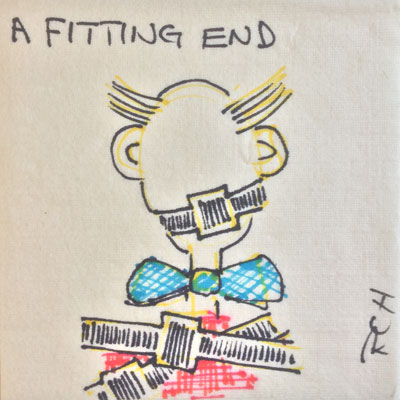
Sea Gull Cellar Bar Napkin Art, Roy Hoggard artist
Part of the problem is that we may be overestimating how much people actually judge high-profile figures like Trump on the basis of honesty. “It turns out that people want their politicians to lie to them — people view politics as a mean to an end, and if they care about the ends, they’re willing for the means to be a little bit more crooked,” said Dan Ariely, a behavioral economist at Duke and the author of The Honest Truth About Dishonesty: How We Lie to Everyone—Especially Ourselves.
In the short term the benefits of dishonesty may be too good to resist. Dishonesty in the workplace, for example, remains high in spite of the negative long term impact and policies set up to counteract it.
The traditional argument against dishonesty is that when you are discovered, your reputation will be sullied. No one will want to buy your products or services again, but obviously, that argument is not convincing enough. People think they will never get caught, or they justify their deception with the promise of improving profits. Even though company leaders and employees are aware of the risks, they are choosing to engage in these activities anyway.
One kind of dishonesty is to mislead by telling the truth. For example, you might tell a friend you can’t go to an event because you have a ton of work to do. It may be true you have a lot of work to do but what you don’t say is that you don’t have to do the work tonight. “Misleading by “telling the truth” is so pervasive in daily life that a new term has recently been employed by psychologists to describe it: paltering.” (The Disturbing Art of Lying by Telling the Truth)
Offering less than the whole truth is a sophisticated form of lying. In sworn testimony we are asked to tell the truth, the whole truth, and nothing but the truth. Holding back information enables some to do something they might not do if required to justify their actions publicly. One unforgettable example of the dangers of holding back information and then bursting forth with your version of the truth is the speech by Jack Nicholson in A Few Good Men.
Fiction is by definition a lie yet various authors interpret this differently. Do creative people lie more than others? Psychology professor Dan Ariely thinks so.
We find that when we look at personality tests of who cheats more, we thought maybe people who take more risk – maybe risk-takers cheat more. No. Maybe intelligent people. No. Creative people cheat more. And why do creative people cheat more? Because cheating is all about being able to tell a story about why what we want is actually OK. And sadly, I think I’m creative.
According to Salman Rusdie, “the truth is that truth has always been a contested idea.” (Truth, Lies and Literature; The New Yorker, May 31, 2018) Yet, the quote by Christina Stead at the top of this blog shows that many authors think there is such a thing as truth and that it is important. “The thing we prized most in [Mary] McCarthy was the no-holds-barred honesty with which she nailed the situation.” (The Company They Kept, Vivian Gornick, The New Yorker, June 2013). David Foster Wallace said in an interview “Fiction’s what it is to be a fucking human being.” His friend, Jonathan Franzen once gave a speech on Honesty and the Lines of Literature in which he admitted the risks of radical honesty in Wallace’s case: “You know, honesty was a life and death struggle for Dave.”
But aren’t there good reasons to be honest even when we don’t think we need to be? Of course. Here are just three: even telling a small lie risks being unmasked as a liar, which would not only damage our reputation but also reduce the proclivity of others to trust us; further, one lie often leads to the need to tell another, more significant lie, which risks even greater negative consequences if discovered; finally, we can’t necessarily predict the consequences of telling even a small lie, and if such consequences turn out to be more significantly adverse than we anticipated, our sense of responsibility and therefore guiltcould cause us far more distress than we imagine. Alex Lickerman, Why Be Honest?
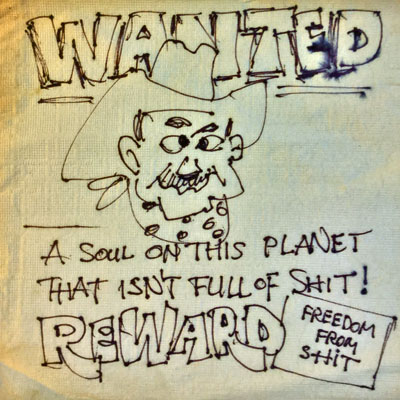
Sea Gull Cellar Bar Napkin Art, artist unknown
It’s hard to tell sometimes if someone is a liar or just a bull shitter. Either way the consequences can be dire when that person is in a position of power. Sam Harris explains this quite well in the following interview. I will use it as my final comment on honesty for now.

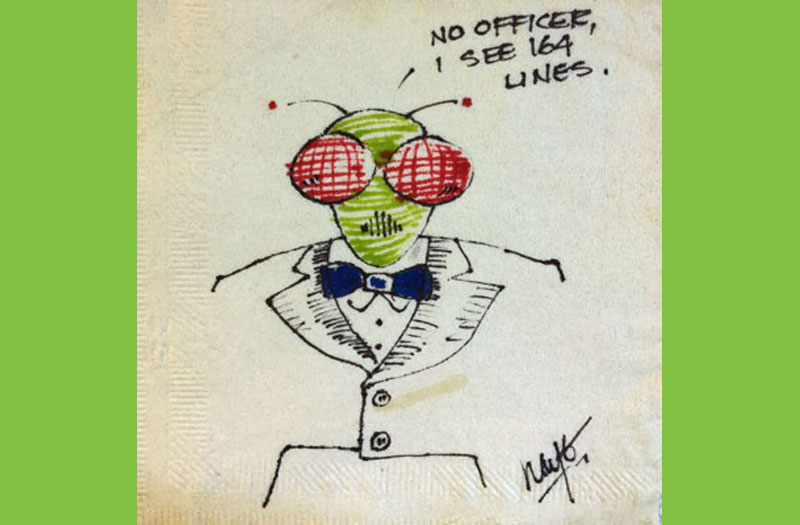
Good stuff, KD.
This needs to be front and center of today’s thinking. Ironically, the religious right warned of a post-modern world where there is “no truth”, though I don’t they think understand truth. Their critique mantra was “it’s only true if you believe it’s true.” Now they have become what they despised. Trump may be, strike that, is, the Anti-Christ.
I recall Jimmy Carter once said during the Clinton impeachment a lie that brings life is not a lie.
Harris is a little unfair to Obama on healthcare. I liked my doctor and still have my doctor under Obamacare and my premium went from $32k to $7k…
Keep up the good work. You are one of the best “wordsmith” in the blogosphre.